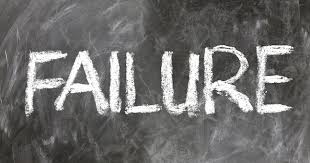We never, purposefully, set out to fail. But our fear of failure prevents us from learning, improving, and growing. This fear of failure, whether self or organizationally imposed, actually condemns us to more failures over time.
We create all sorts of mantras, suggesting we don’t fear failure. “Fail fast, fail often!” “Fail forward.” “Move fast and break things.” Yet when we fail, we tend to punish those we perceive to have failed. We fire a person who hasn’t made their quota, we fail to look at why and what might be done to reverse it.
We create structures and rules that focused on eliminating the possibility of failure. We have precise scripts and playbooks, from which deviations are discouraged. We have activity metrics that we must achieve. We have strict guidelines about outreach and the messages we should be sending. We focus on winning, growth regardless of cost. Achieving our goals, hitting our quotas is the only thing acceptable. Add your favorites to this list….
Yet, when we look at these things, too many individuals and organizations are failing. Yet we refuse to confront those failures, opting instead to ramp up the efforts, thinking more is better, but in reality increasing our failures.
We must keep our managers off our backs, we must keep our boards, investors, shareholders happy. We find excuses for our failures, rather than trying to understand them.
What if we took a different perspective on failure? What if we looked a failure as an option? Then the challenge is what we do with failure!
In moving a new person into a job, we want to do everything possible to help them succeed, but what if we said, “You are going to get your teeth kicked in, every once in a while. When you do, let’s see what we can learn?” We dive into where they are failing, understanding what happened, why, how we might change to avoid it in the future. We learn and grow from that experience, minimizing future failures of the same type.
Or in putting a program in place recognizing it will have to be tuned, adapted and changed as we learn more. It won’t be perfect, but if we learn where it’s not working and adjust, we will succeed.
Or in coaching an individual, rather than pointing out what’s wrong, what if we went one step further to see what we and the individual might learn about it, how we might change, and what we might do to avoid repeating the things that caused the individual to fail.
Likewise, in looking at our organizations probing, “What’s working, what’s not working, what can we learn, what should we change?”
We don’t want to purposefully fail, but we must recognize failure is an option.
In recognizing failure is an option, we can acknowledge it, learn from it, change, adapt, and succeed.

Leave a Reply